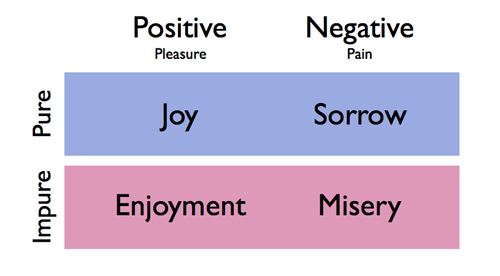 We read in the scriptures, “Men are that they might have joy.”
We read in the scriptures, “Men are that they might have joy.”
What does this mean? Does this mean that if we experience sorrow, we aren’t living up to our full potential? I don’t think so. I think that it is fully possible for someone to find purpose and meaning in his or her life, even in the midst of sorrow and pain. Viktor Frankl has taught us that living in a Nazi death camp does not render life meaningless, and that it is possible to find peace even in those moments of torture.
I think that we came to earth to experience pain. That is part of our purpose in being here. In addition, I think that it is difficult, if not impossible, to fully understand joy without also experiencing sorrow.
However, this does not mean that we came here to experience sin. Pain and sorrow can be experienced without sin (and often is). The consequences of sin certainly provide an occasion for the pure of heart to experience sorrow. But so do other kinds of pain, such as pain which results from illness, death, accidents, or acts of nature. It seems clear that the central lesson we need to learn does not require the existence of sin—only the possibility of sin. Now, because we all sin, God has provided us with a Savior who can rescue us from the impurities in our hearts. But sin is not why we are here.
Adam and Eve crossed over into a different world (the literal meaning of the word transgress) in order to experience the difference between joy and sorrow (the two ways of loving), but this does not mean that sorrow is the result of sin or evil. The consequences of sin are found in the bottom row of the chart, not the right column. The real lesson we’re sent here to learn is love. Of course, we can’t get into the top row of the chart (the row of love) without giving up sin, so repentance is still at the heart of our purpose here.
The gospel of Jesus Christ is all about pulling us out of the bottom row of the chart, and inviting us into the top row. We talk a great deal in the Church about happiness, but it’s important to remember that that word is sometimes used ambiguously. We don’t want to give people the impression that living the gospel will guarantee that they have no more negative experiences.
I actually believe that the happiness that we seek in the gospel is better described by the word peace. Whether we are experiencing love in the form of joy or sorrow, I believe we are also experiencing peace. God, even in the midst of His sorrow and weeping for our sins, still experienced peace. I believe that the way Christ makes our pain more endurable is by turning it into love, and by doing so we can experience peace, even in the midst of our pain. Christ said, “Peace I leave with you, my peace I give unto you: not as the world giveth, give I unto you. Let not your heart be troubled, neither let it be afraid.” ((John 14:27))
I think the peace that comes through love is what constitutes the “happiness” that God promises the righteous, and it can be experienced through joy or sorrow. That is, God doesn’t promise us that we’ll be in the left column of the chart, only that we’ll be on the top row. That we’ll be able to find peace as we have negative or positive experiences in an other-centered way (instead of a self-centered way).
In summary, whenever I say that the Gospel is designed to bring us happiness or joy, I really mean that the Gospel is designed to bring us peace and to teach us how to love in the midst of pain. I think that happiness and peace, in an ultimate eternal sense, is synonymous with love, and can thus encompass both joy and sorrow. That is, when God is weeping with sorrow for the sins and heartaches of His children, His heart is always and forever still at peace, and this is the tranquility and happiness that He wants to share with us.
I think this puts a new spin on the scripture, “Men are that they might have joy.” Again, words are not always used the same in every context. The word “joy” here may not mean “positive emotional experiences.” It may simply mean peace and love in the midst of pain. And that is something I think we need to include when teaching about Christ’s plan of happiness and redemption.


I have really enjoyed your series on joy and pain. My experience this past year of taking an experience, caused by another and changing what used to be misery to sorrow, learning to find peace in spite of pain is an amazing transformation of the soul. I bear witness it works.
I like the idea of being able to interchange joy and peace in the language of what men are to strive towards in this life. It seems that we often talk about this in the context of being sinners, or of having things happen which are simply part of being mortal; pain, illness, old age, etc.
What I have a harder time fitting into your simple two on top, two on bottom rubric, is when we are the ones sinned against. I can understand that Godly sorrow and the desire not to sin again is how a person who has sinned finds peace, so that they can go forward and “sin no more,” this moving towards experiences where their choices lead to joy. I am not sure how those who have been significantly sinned against, would find themselves here.
If a child is sexually molested, physically abused, mentally and emotionally damaged, where are they supposed to fall? Do they try to be sorrowful for their abuse? Find joy in it? Ideally at some point they will find joy in the Atonement, or at least make peace with their past, but being the one sinned against, and trying to deal with the emotional, physical and spiritual consequences seems to miss those who are not just in a situation by an accident of age or illness, but who are the target of someone else’s sin. I am not sure where that individual would start looking for peace I. This model.
(Looking forward to your thoughts!)
Juliathepoet,
In the chart that I use, the term “sorrow” means more than being “sorry.” I’m including in the term sorrow a whole host of experiences that may not have to do with sin at all. For example, Jesus wept when he heard of Lazarus’s death—that would be a form of “sorrow.” Enoch saw God weep for the sins of mankind—that would be a form of “sorrow” as well. Thus, I’m using the word “sorrow” differently and more broadly than Paul uses it when he talks about “Godly sorrow” for our sins.
I think that without Christ, when we are hurt, wronged, abused, or damaged by others, there is the possibility of our pain turning into resentment towards our abusers. We begin to hate them in our hearts. But when we bring Christ into our hearts, He can allow us to forgive, and can transform our hurt into the misery of self-pity and resentment into a genuine concern for (1) the spiritual well-being of those who’ve wronged us, and (2) others who hurt like we do. Those two experiences are a form of “sorrow” in the way that I’m using the terms.
The articles, “Two Types of Suffering” and “Transforming Misery into Sorrow” explore this a little bit. Have you had a change to read them? You can get to them in the green “series” box to the right of the article.
Thoughts?
Juliathepoet – I can say with full certainty this course outlines is applicable to those who have been sinned against. My experience encompasses a 24 year period of time that involves serious transgression and extreme pain to myself, my marriage and my children. It has taken me way too long to figure out what Br. Thayne outlined here. I tried everything in my attempts to work through my pain. Engrossed in those efforts also were bitterness and misery. I took yet again another serious affront to me personally to realize there was one way though this — it was to learn to love the offender and myself. It was to allow myself to recognize sorrow without carrying around all the misery. Why I couldn’t figure this out all before so that I could have peace finds reason in a lesson taught by Br. S. Michael Wilcox that ‘there needed to be a holding place.’ I am grateful for these principles have helped me.